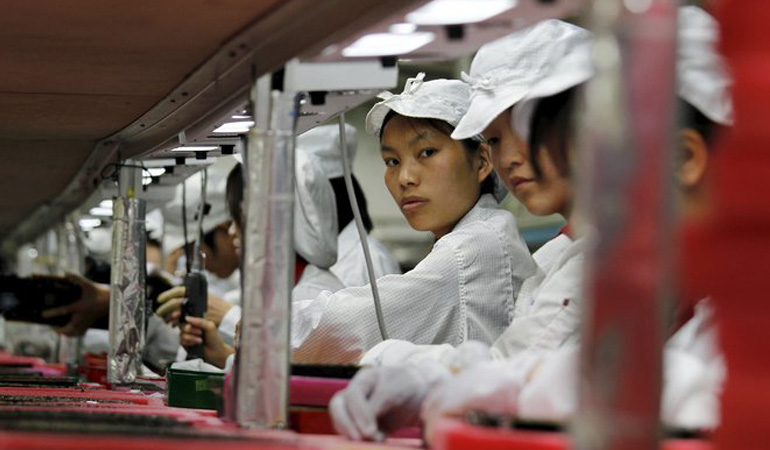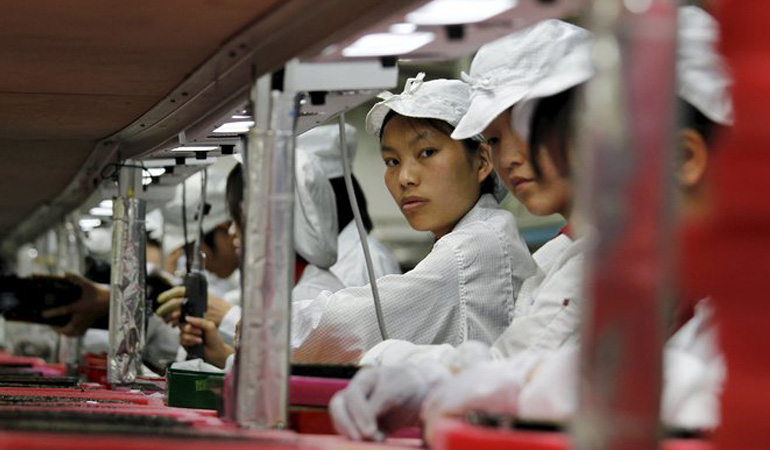What US$3.5 billion can buy you today.
Foxconn, the Chinese company with a 100,000 workers who churn out Apple iPhones daily, has struck a deal to acquire control of Sharp Corporation for US$3.5 billion, after weeks of negotiations and setbacks.
According to analysts, the deal, for a 66% stake is intended to make Foxconn a more attractive partner for Apple which uses Sharp screens, and could give Foxconn added leverage in dealings between the two.
 Foxconn employs 100,000 workers.
Foxconn employs 100,000 workers.
While Foxconn basks in the status as the world’s largest maker of hardware for companies like Apple and Sony, it appears that those relationships are now shifting and Foxconn is not going to left behind.
According to estimates by the research firm HIS, the screen is a lucrative piece of the smartphone, costing as much as US$54 per unit. Sharp presentlyprovides roughly 25% of the iPhone displays, IHS said.
However, some analysts have told global reporters that the Sharp purchase will saddle Foxconn with an ailing business that will take considerable money and effort to turn around. Reflecting those problems, the purchase price is US$2 billion lower than a deal the two sides struck just last month, after Sharp disclosed the potential for costly problems, nearly US$3 billion in potential liabilities, down the road.
But Apple has been diversifying its supply chain, giving some production contracts to other assemblers and component makers. And Foxconn is grappling with China’s rising labor costs and a slowdown in the global smartphone market.
Like China itself, the Taiwan-based Foxconn appears to be moving up from basic manufacturing to higher-end businesses and it has been reported that the
deal highlights the enormous pressure that the industry’s shifting dynamics are placing on the company.
Harvard Business School professor Willy C. Shih, told the New York Times this week that, “On the one hand, you can see why Foxconn is trying to do it. It’s not clear the economics make sense, but it’s that they need to control more and more of the supply chain.”
He noted that Apple might soon switch to screens made by other producers.
The deal follows months of back-and-forth talks about the terms, including the surprise disclosure last month of billions of dollars’ worth of potential problems on Sharp’s books. Acknowledging Sharp’s poor performance, , Foxconn’s founder and chairman Terry Gou, said in the media release that he was “confident that we will unlock Sharp’s true potential.”
Foxconn, formally known as Hon Hai Precision Industry, has been looking in recent years for ways to further cut costs, including investment in automation. It has also expanded into businesses potentially more lucrative than unskilled-work manufacturing, opening factories producing new technology like batteries for electric cars. It even created incubators to help hardware start-ups.
The New Yok Times writes that, Foxconn, most of whose factories are in China, is emblematic of the challenges facing the Chinese economy at large. Even while it tries to maintain the huge scale and efficiency of its production base, it is trying to climb the value chain to find new, more profitable streams of revenue.
Near Beijing, Foxconn operates a hardware incubator called Innoconn, which helps start-ups with production management while looking for investment targets.
The founder of Noitom a company that makes motion-capture sensors and hardware Liu Haoyang, said Foxconn had approached Noitom when it was seeking crowdfunding for a sample product in 2014. Ultimately, Foxconn gave Noitom advice, and it now helps Noitom produce, Liu said.
“They make parts of high complexity for us,” he said. “Average factories aren’t able to make this type of thing, never mind in small batches.”

